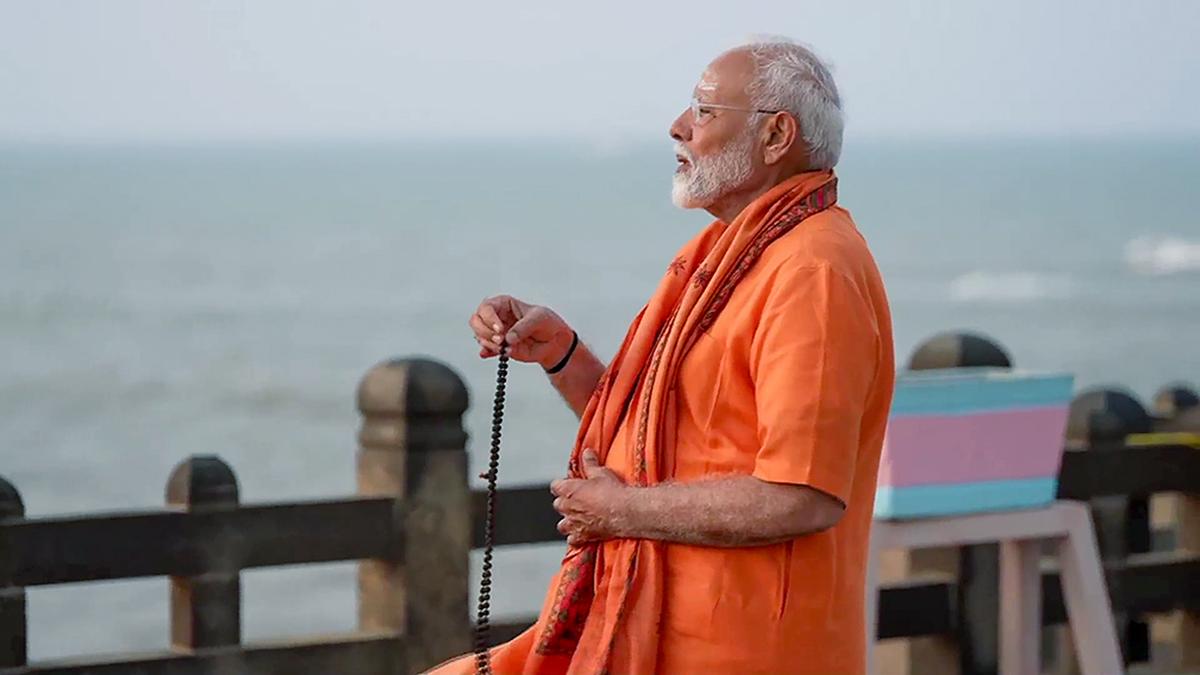
At Vivekananda-related colleges, academics split over PM Modi’s ‘meditation’
The Hindu
At Vivekananda-related institutions, academicians are split in their opinions over PM Modi’s 45-hour meditation at Kanyakumari
Academics associated with the Ramakrishna Mission — founded by Swami Vivekananda in 1897 — are divided over Prime Minister Narendra Modi sitting for meditation, like the monk, at Kanyakumari, with some calling it a “cheap” stunt and some others supporting him.
On Thursday evening, after finishing campaigning for the last phase of elections that will take place on Saturday, Mr. Modi began a 45-hour long meditation at the Vivekananda Rock Memorial, where the monk had meditated in 1893.
“It is the place where Swamiji meditated for three consecutive days and the central theme of his meditation was the uplift of his motherland, India. For the first time, anybody, most importantly a monk, wept for the deterioration of his motherland and his people, and meditated to have a way out to pull her up from that degraded condition. After the construction of a temple and meditation hall on that rock, named after Swami Vivekananda, any individual can go there, pay respects to Swamiji and practice meditation. The Prime Minister could have done that,” Professor Susobhan Sengupta, who teaches history at RK Mission Residential College in Narendrapur, said.
“But taking media persons to capture him meditating has a different meaning for me. He did the same in 2019 at Kedarnath. Present-day political leaders have neither any morality nor any conscience. For capturing and retaining power they can go at any length. And in a country where the majority of the voters are half-educated, these cheap stunts pay,” Professor Sengupta said.
Retired professor Achintyam Chatterjee, who taught political science at the same college and is now a guest teacher there, said that while Mr. Modi’s meditation can be considered a political gimmick by some, it requires strength to carry out such a gimmick and that by promoting meditation, the Prime Minister was adding a new dimension to politics.
“I think this is a brilliant step. Even if you consider this a gimmick, this kind of gimmick is tough, it needs strength. Mr. Modi has added a new dimension to politics, he has shown that politics and meditation go side by side,” Professor Chatterjee, who himself made recent meditation trips to two Ramakrishna Mission-related ashrams in Uttarakhand, said.
“Ramakrishna Mission has always advocated meditation because without meditation you cannot see your own mind. You can get what you deserve only when you uplift yourself, and you can uplift yourself only through meditation. I think the Prime Minister’s meditation will only attract a vast majority of people, particularly the younger generation, towards meditation - something good for the country,” the retired teacher, who is now a faculty member of the civil service classes at the Ramakrishna Mission Institute of Culture in Kolkata, said.

“Writing, in general, is a very solitary process,” says Yauvanika Chopra, Associate Director at The New India Foundation (NIF), which, earlier this year, announced the 12th edition of its NIF Book Fellowships for research and scholarship about Indian history after Independence. While authors, in general, are built for it, it can still get very lonely, says Chopra, pointing out that the fellowship’s community support is as valuable as the monetary benefits it offers. “There is a solid community of NIF fellows, trustees, language experts, jury members, all of whom are incredibly competent,” she says. “They really help make authors feel supported from manuscript to publication, so you never feel like you’re struggling through isolation.”

Several principals of government and private schools in Delhi on Tuesday said the Directorate of Education (DoE) circular from a day earlier, directing schools to conduct classes in ‘hybrid’ mode, had caused confusion regarding day-to-day operations as they did not know how many students would return to school from Wednesday and how would teachers instruct in two modes — online and in person — at once. The DoE circular on Monday had also stated that the option to “exercise online mode of education, wherever available, shall vest with the students and their guardians”. Several schoolteachers also expressed confusion regarding the DoE order. A government schoolteacher said he was unsure of how to cope with the resumption of physical classes, given that the order directing government offices to ensure that 50% of the employees work from home is still in place. On Monday, the Commission for Air Quality Management in the National Capital Region and Adjoining Areas (CAQM) had, on the orders of the Supreme Court, directed schools in Delhi-NCR to shift classes to the hybrid mode, following which the DoE had issued the circular. The court had urged the Centre’s pollution watchdog to consider restarting physical classes due to many students missing out on the mid-day meals and lacking the necessary means to attend classes online. The CAQM had, on November 20, asked schools in Delhi-NCR to shift to the online mode of teaching.









